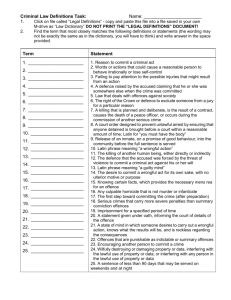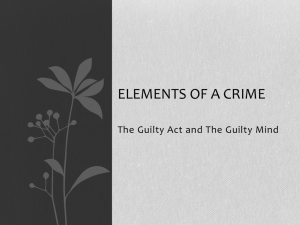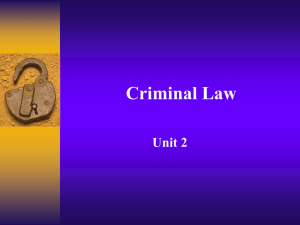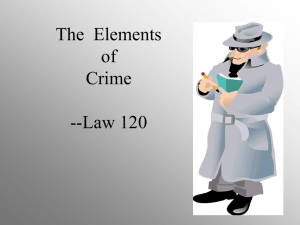Unit 3- Crime and the Law
advertisement
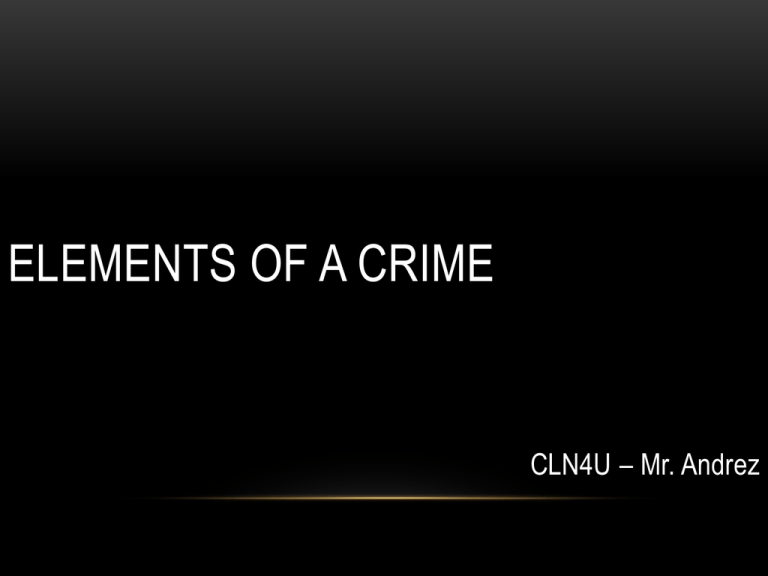
ELEMENTS OF A CRIME CLN4U – Mr. Andrez SCENARIO •You are driving along and you are stopped by a police officer who notices that you were texting at the last red light. The police officer informs you that you have broken the new law banning cell phones in Ontario. Are you entitled to use the fact that you did not know the law as a defense? THE ANSWER - NO! • S. 19 of the Criminal Code states that ignorance of the law is no excuse for the commission of a crime • Is this a reasonable assumption? ACTUS REUS Refers to “guilty act” • The physical act involved in commission of offense • The actus reus of a criminal offense is found in its criminal code definition • • • Eg. s. 265 of the Criminal Code defines assault: (1) A person commits assault when (a) Without the consent of another person, he applies force intentionally to that person, either directly or indirectly For actus reus, a person must actually hit another person ACTUS REUS • To prove actus reus, the Crown would have to demonstrate that 1. there was no consent 2. force was applied EXCEPTION: AUTOMATISM AND ACTUS REUS • Actus Reus of a criminal act must be voluntary • If someone shoots someone while sleep walking, he may not be criminally liable • E.g. Kenneth Parks case 1992- The Supreme Court upheld the acquittal of Parks whose defense was that he was sleepwalking when he stabbed his mother in law to death • His defense was that he acted involuntarily (automatism) MENS REA • Refers to having a “guilty mind.” • Phrase infers moral guilt and the accused knowing they did something wrong • To meet the legal definition of a crime, the Crown must prove an act was done with criminal intent OR knowledge that what he/she did was against the law 1). INTENT • Intent, in the legal sense, means to carry out an act with intent, with knowledge, or by being reckless or wilfully blind to the consequences of an act. • E.g. If John threw a knife up in the air, which accidently killed Luke, would Johnny likely be guilty of manslaugher? • Yes, because you cannot be “wilfully blind” to the consequences of your actions GENERAL INTENT VERSUS SPECIFIC INTENT • General intent • Means to commit a wrongful act for its own sake, with no other purpose or motive • Dave punches Luke because he is angry. Dave has general intent to commit assault. • For mens rea to be proven, all that needs to be done is to show that Dave punched Luke GENERAL INTENT VERSUS SPECIFIC INTENT • Specific intent • Involves intent in addition to the general intent to commit the crime • It is committing one wrongful act to accomplish another • E.g Burglary is the breaking and entering of a dwelling-house with intent to commit an indictable offense. The break and enter requires general intent, the intent to commit an indictable offense requires specific intent • In order to prove burglary, the Crown not only has to show that a person broke into a house, but also had the specific intent of stealing. INTENT VS MOTIVE • While intent refers to the state of mind with which an act is done or not done • Motive is what prompts a person to commit an act or not act • If a person kills her mother to receive an inheritance, the inheritance is motive. This does not establish state of mind to commit murder • Crown must prove intent by showing killing was planned and deliberate 2). KNOWLEDGE • In order to have the requisite mens rea to commit a crime, a person must have some knowledge of the actus reus of the crime • Eg. S 268 1 (a) of the Criminal Code states that “Everyone who, knowing that a document is forged, uses, deals, or acts upon it” is guilty of circulating a forged document • To establish guilt, the Crown only has to prove that the person knew the document was forged.... Nothing about intent. 3). RECKLESSNESS & NEGLIGENCE • Crown can also establish mens rea by proving accused acted reckless or negligent. • Recklessness • Usually involves taking an unjustifiable risk that a reasonable person would not take • Eg. recklessly shooting a pellet gun into a crowd. The accused may not have tried to hurt someone, but they should have been able to foresee harm • Negligence • doing something or omitting to do something with “wanton disregard for the lives or safety of other persons” Example: throwing a beer bottle out of a moving vehicle and injuring someone 4). WILLFUL BLINDNESS • Suspects a criminal outcome but does not ask the questions to confirm turning a blind eye to the consequences of your action Example: buying stolen property that you should know has been stolen • Eg. transporting something illegal such as drugs in a trunk TYPES OF CRIMINAL OFFENCES CRIMINAL CODE • Contains 28 parts and includes a range of offenses • Canada is different from the United States • US- felonies and misdemeanour offenses • Canada- Indictable, summary and hybrid offenses SUMMARY OFFENCE • Minor offences for which an accused can be arrested or summoned to court without delay. Maximum penalty is $2000 and/or 6 months imprisonment. • Summary offences are tried in Provincial Court without a jury (i.e. judge alone) • E.g. Public Nudity, Cruelty to animals, trespassing at night INDICTABLE OFFENCES • Serious crimes that incur more severe penalties. • Penalties for indictable offences are set out for each offence in the Criminal code of Canada. • Maximum penalty is life, with no possibility for parole for 25 years. • E.g. Perjury, arson, murder INDICTABLE OFFENCES • The accused is permitted to choose the trial procedure for some types of indictable offences although for some indictable offences, the Criminal Code states the required trial procedure, but usually the choice is up to the accused. There are three types of trial procedures: 1. trial by a provincial court judge, 2. trial by superior court judge without a jury, and 3. trial by superior court judge with a jury. The most serious of indictable offences, such as murder or treason, are tried before a judge and jury. HYBRID OFFENCES • Known also as dual procedure offences • Offences where the Crown has the right to choose whether to prosecute the offence as a summary or indictable offence depending on the severity and circumstances of the offence • E.g. assault, theft under $5000, criminal harassment QUASI-CRIMINAL OFFENCES • Technically, laws passed by the provinces, territories, or municipalities are not considered part of criminal law. • they resemble criminal law but do not deal with actual crimes. • i.e. traffic offences that fall under the Highway Traffic Act of each province and bylaws passed by municipalities. • Breaking these laws usually results in a fine. • a court appearance is not usually necessary, unless you enter a plea of not guilty. STRICT VS. ABSOLUTE LIABILITY OFFENCES STRICT LIABILITY • For some crimes or offences (less serious), the Crown only needs prove the actus reus of the offense (just the guilty act) • Strict liability offenses, the accused will be convicted unless it is demonstrated that they acted with due diligence (acted as any reasonable person would under the circumstances) • The word knowingly is not in the crime definition • Only defense would be due diligence– that they took precautions to avoid dumping pollutants • Monitoring devices were faulty • Special training for staff working on keeping river clean ABSOLUTE LIABILITY • These offenses allow for no defense, fault is not an issue, and the accused will be convicted based on the actus reus of the offense • i.e. driving with a suspended license, speeding CRIME: COMPANY X DISCHARGES POLLUTANTS INTO A RIVER Mens Rea Offence Absolute Liability Offence Strict Liability Offence Crown must prove Company X will be Crown must prove Actus Reus and Mens Rea Did Company X discharge pollutants intentionally and recklessly found guilty if the Crown establishes the Actus Reus of discharging pollutants Actus Reus Company X can avoid liability if it can demonstrate that it made reasonable efforts to avoid discharging pollutants Understanding Incomplete Crimes Incomplete Crimes Incomplete crimes are generally considered to be crimes where the actus reus element has not been completed. Note: Attempted crimes are NOT considered incomplete crimes! The mere fact that an attempt fails does not mean the crime lacks actus reus. Incomplete crimes generally include: • conspiracy • aiding • abetting • accessory After the fact • Party to common Intention • Counselling Sidebar Criminal Attempts 24. (1) Every one who, having an intent to commit an offence, does or omits to do anything for the purpose of carrying out the intention is guilty of an attempt to commit the offence whether or not it was possible under the circumstances to commit the offence. Question: How far does one have to go to be charged with an “attempted” offence? Preparation is not enough to constitute an attempt. 24. (2) The question whether an act or omission by a person who has an intent to commit an offence is or is not mere preparation to commit the offence, and too remote to constitute an attempt to commit the offence, is a question of law. Conspiracy Conspiracy: An agreement between two or more persons to commit a criminal act. Those forming the conspiracy are called conspirators. Party to Common Intention Shared responsibility among criminals for any additional offences that are committed in the course of the crime they originally intended to commit. Aid / Abet Aid: Help commit a crime. To assist by way of an action that, in of itself, is not a crime. (ie. Looking out for police.) Standing on a corner looking at cars coming down the road is not a criminal act, but the mental intent in this circumstance constitutes a criminal offence. Abet: The act of encouraging or inciting another to do a certain thing, such as a crime. The act itself may not be criminal (ie. shouting at someone), but the mental intent (ie. encouraging someone to commit a crime) is criminal. Accessory After the fact: 23. (1) An accessory after the fact to an offence is one who, knowing that a person has been a party to the offence, receives, comforts or assists that person for the purpose of enabling that person to escape. (2) [Repealed, 2000, c. 12, s. 92] This used to state: No married person whose spouse has been a party to an offence is an accessory after the fact to that offence by receiving, comforting or assisting the spouse for the purpose of enabling that person to escape. COUNSELLING • A crime that involves advising, recommending or persuading another person to commit a criminal offence.

